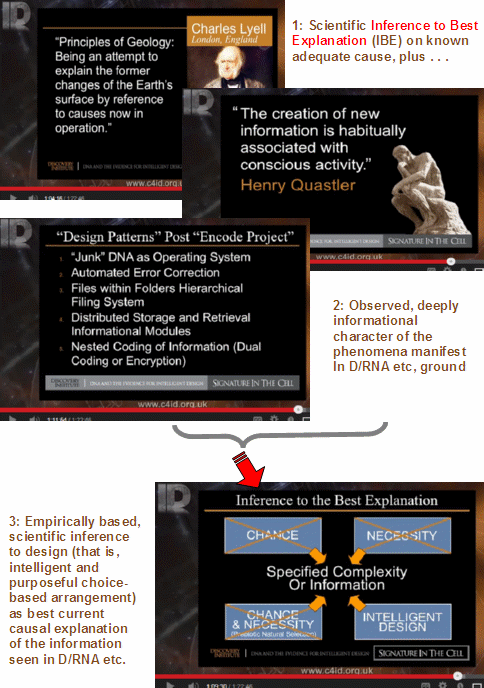Take an hour and a half to learn what ID is about (yes, what it is really about [and cf. here at UD for correctives to common strawman distortions . . . ]), with particular focus on the origin of cell based life [OoL], through watching a public presentation in the UK from a leading ID thinker, Stephen Meyer.
Notice the distinction he underscores relative to the common demonising rhetorical projection of “Right-wing Fundamentalist theocratic agendas” etc.
I clip from the video:
Let me also draw in the design inference explanatory filter considered on a per aspect basis, as was presented in the very first post in the ID Foundations series:

(NB: Observe Meyer here, on ID’s scientific bona fides.)
It is probably also helpful to add the following, from a reply by Meyer to a hostile review of his book, Signature in the Cell. (It seems that things have got worse over the past few years, we used to have no-views — hostile pretended “reviews” of books not read — now we have hostile no-views of books not yet published.)
The central argument of my book is that intelligent design—the activity of a conscious and rational deliberative agent—best explains the origin of the information necessary to produce the first living cell. I argue this because of two things that we know from our uniform and repeated experience, which following Charles Darwin I take to be the basis of all scientific reasoning about the past. First, intelligent agents have demonstrated the capacity to produce large amounts of functionally specified information (especially in a digital form). [–> Notice the usage] Second, no undirected chemical process has demonstrated this power. Hence, intelligent design provides the best—most causally adequate—explanation for the origin of the information necessary to produce the first life from simpler non-living chemicals. In other words, intelligent design is the only explanation that cites a cause known to have the capacity to produce the key effect in question . . . . In order to [[scientifically refute this inductive conclusion] Falk would need to show that some undirected material cause has [[empirically] demonstrated the power to produce functional biological information apart from the guidance or activity a designing mind. Neither Falk [[the hostile reviewer], nor anyone working in origin-of-life biology, has succeeded in doing this . . .
Food for thought.
Foundational. END
